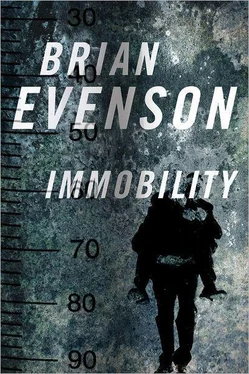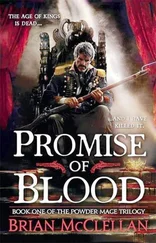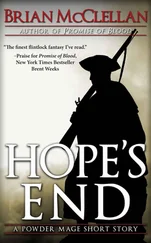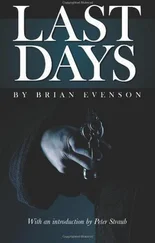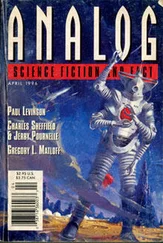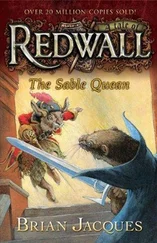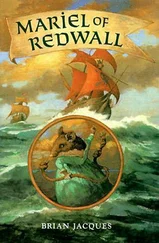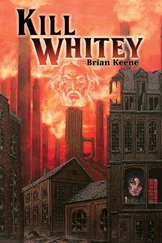“Just in case,” said Rykte, and winked.
In the basement, Rykte told him, he was trying to grow mushrooms, something to supplement their diet. So far without much success. A shed not far from the outhouse served for storage, was filled with anything that Rykte had scavenged that he thought might be useful. He carried Horkai out to it and Horkai was surprised to see only practical things, no relics or mementos to recall past days, just tools, lumber, rope, bits and pieces of metal, rolls of medical tape, vacuum-sealed packets of freeze-dried foods. A hand-cranked distiller surrounded by canister after canister of distilled water.
“What if you run out of food?” asked Horkai.
“There were enough people around here with food storage that at first it wasn’t a problem,” said Rykte. “Can’t see that it’ll be a problem in my lifetime. Plus I’m trying to get mushrooms going in several basements around here. Should be okay eventually.”
“You’re not lonely?” asked Horkai after a few days.
Rykte shrugged. “A little,” he admitted. “But I learned early on to keep my distance. Others always want something from you, especially when they realize you can survive outside. Before you know it, they’re no longer asking you for something; they’re holding a gun to your head and trying to force it out of you.”
“Do you feel that way about me?”
“You’re welcome to stay as long as you want, if that’s what you’re asking,” Rykte said. “You don’t bother me.”
* * *
“WHAT ABOUT YOUR LEGS?” Rykte asked him a few days later when he saw one of Horkai’s legs shivering. “I thought you must have been paralyzed before the change.”
“No, not before,” said Horkai.
“Well, then they’ll come back,” said Rykte. “They’re already coming back.”
“They can’t,” said Horkai. “I’m ill. If my spine reconnects, it’ll travel to my brain and kill me.”
Rykte looked at him for a long time, finally shook his head. “Doesn’t sound right,” he said. “Do you know this for a fact?”
“I was told,” said Horkai.
“Is it possible that whoever told you this might have had some reason to lie?”
“It’s not impossible,” Horkai said.
“I haven’t had even as much as a cold since the change,” said Rykte. “I can drive a rusty nail into my forehead and come away tetanus free. Early on, I lost an eye in a scuffle only to have it grow back a few days later, good as new. We age, but not very quickly, not as quickly as we did before. Whatever happened to our bodies purified them, made them no longer subject to certain conditions that other mortals face. Our bodies have been transformed, and that has made us not only very hard to kill but also very hard to injure.”
“And so I’m being lied to?”
Rykte shrugged. “Let your spine grow back together and find out. It’s worth the risk.”
* * *
THE BRIEF QUIVERING IN HIS LEGS was followed by a tingling sensation, then by little jabs of pain. Over the course of a week he tried mentally to will his legs to move, found that they would but not in the way he expected them to, flopping and spasming instead.
Rykte told him not to worry, that everything would come back. He sat beside Horkai, massaging the legs and moving them carefully back and forth, up and down, helping them relearn the movements they had lost.
“What did you do before the Kollaps?” Horkai asked during one of these sessions.
“Why do you say it that way?” asked Rykte, not looking up from his legs. “Why do you pronounce it like it’s a foreign word?”
“I don’t know,” said Horkai. “That’s how they say it where I’m from.”
“And where is that?”
“I don’t know,” said Horkai. “I can’t remember things very well.”
“What did I do?” asked Rykte. “Not much. Went to high school. I was sixteen when things fell apart.”
“You watched your parents die?”
Rykte looked up, nodded. “My parents,” he said. “My friends, my neighbors, people I knew from school, from church. Those who survived the first blast were afraid of me, and then hated me. A few of them even tried to kill me. And then, fairly quickly, most of them died.”
“I’m sorry,” said Horkai.
“Why?” said Rykte. “You weren’t one of them. You don’t have anything to be sorry for.”
* * *
AFTER A FEW MORE DAYS, his quivering legs learned to hold him upright for a moment or two. Rykte would stand him upright and he would stand there until the legs suddenly gave out and he’d go down, and Rykte would have to catch him. A day after that, he watched Rykte walk away from the house in the early morning, a rifle slung across his back, and disappear. He was gone for several hours, but when he returned he was carrying two aluminum underarm crutches.
“Was looking for forearm crutches,” he said, “but I didn’t find any. These will have to do.”
By late afternoon and after a few falls, he’d learned how to use the crutches. His sides hurt from where the crutch handles rubbed against him, and the web between his thumb and forefinger was growing sore, had perhaps started to blister. But he could move around on his own power.
He made a few turns around the house, then begged Rykte to take him outside.
“All right,” said Rykte. “In any case, there’s something I want to show you.”
* * *
THEY WENT OUT THE BACK DOOR and past the shed. The crutches were a little more difficult to operate in the dirt, but he managed. Rykte took him to the back fence, then carefully pulled off three of the boards, stacking them to one side. He helped Horkai through the opening.
On the other side was a flat expanse of dirt, then a slow slope down to a drainage ditch through which a feeble stream ran. Unlike the other water he had seen, it wasn’t red. Looking up it, he could see the end of a corrugated pipe from which the water was coming. In the other direction it went straight for a while then curved before it was lost behind a fence.
“What did you want me to see?” Horkai asked.
“This,” said Rykte, and pointed at the stream.
Water, thought Horkai. So what? He looked back up at Rykte. “I don’t understand,” he said.
“Look closer,” said Rykte.
And so he did, trying to see what it was about the water that made it different, made it unusual. Was it a little cleaner, a little purer? Maybe, but not enough to make much of a difference. The color was a little strange, maybe, but …
And then he realized and almost fell. “Oh my God,” he said. It wasn’t the water that was a strange color but what was at the bottom of the streambed. There was a thin layer of moss, very pale but there.
“It’s very delicate,” said Rykte. “Easily damaged. But resistant to the poisons in the air and soil and water. Things are starting to come back, slowly but surely. In another five years, we might even start to see grass. A decade or two after that, and there’ll be flowering plants. Tack on a hundred years, we might even begin to see trees. All this will go on in some way or other. The only thing we humans managed to destroy was ourselves.”
“But we’re not dead yet,” said Horkai.
“With a little luck, we will be soon,” said Rykte. “We’re a curse, a blight. First we gave everything names and then we invented hatred. And then we made the mistake of domesticating animals—almost as big a mistake as that of discovering fire. It’s only one step from there to slavery, and once you think of humans as animals—as mules, say,” he said, giving Horkai a look, “we become a disposable commodity, war a commonplace. Add in a dominant religion that preaches the end of the world and holy books that have been used to justify atrocity after atrocity, and you’re only a step away from annihilation. It’s better not to let society develop at all, to leave each person on their own, alone, shivering, and afraid in the dark.”
Читать дальше
